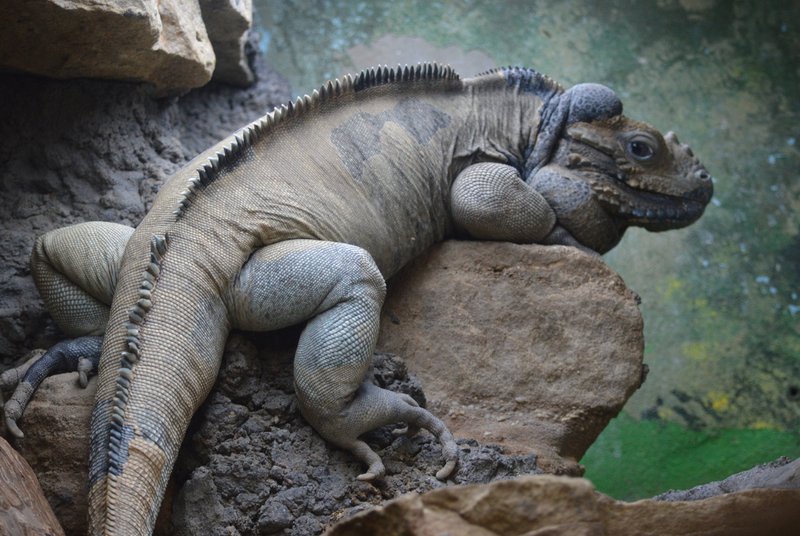
Imagine you’ve got a buddy who’s a little different—maybe a bit shy but still has a unique personality. That’s similar to how rhino iguanas interact with their human counterparts. Unlike more traditionally affectionate pets, rhino iguanas have their own ways of showing they care. Let’s dig deeper into this subject and uncover whether these vibrant reptiles can truly recognize their owners and what that really means.
What Are Rhino Iguanas?
Rhino iguanas are a stunning species found primarily on the Caribbean island of Hispaniola, which is shared by Haiti and the Dominican Republic. These reptiles are known for their distinctive appearance, sporting a spiky crest that runs down their backs, giving them a prehistoric look. They can grow up to 5 feet long, and their skin varies in color, often displaying a mix of gray and green.
But here’s the thing—rhino iguanas aren’t just pretty faces. They’re also quite intelligent. These iguanas require specific care and an enriching environment, making them unique pets. Understanding their behavior is essential for anyone considering adopting one, especially regarding how they connect with their human caregivers.
Can Rhino Iguanas Recognize Their Owners?
You might be wondering if rhino iguanas can recognize their owners like dogs or cats do. The answer is a bit nuanced. While these reptiles don’t express affection in the same way, they are indeed capable of recognizing familiar faces, smells, and voices. They use their excellent vision and sense of smell to identify their surroundings, including their human companions.
When you spend time with a rhino iguana, they may learn to associate your presence with positive experiences, like feeding or handling sessions. This means that over time, they can develop a form of recognition that’s less about emotional attachment and more about familiarity and comfort. They might not come running when you call them, but they will likely be more relaxed in your presence compared to strangers.
The Importance of Socialization
Socialization plays a huge role in a rhino iguana’s ability to recognize their owner. From the moment you bring one home, it’s essential to interact with them regularly. Handling them gently and providing a consistent routine helps them become accustomed to your presence.
Here are some tips for fostering recognition:
- Consistent Interaction: Spend time with your iguana daily to help it feel secure and familiar with you.
- Routine Handling: Make handling a part of their daily routine, giving them positive reinforcement through treats.
- Feed Them: Use feeding time as a bonding experience, as they’re likely to associate your presence with food.
Taking these steps can enhance the likelihood that your rhino iguana will recognize and respond to you.
How Rhino Iguanas Show Affection
While rhino iguanas don’t display affection in the same way that dogs or cats do, they have their own unique ways of showing comfort and trust. You might notice specific behaviors that indicate your iguana feels happy and secure around you.
For example, a relaxed iguana might bask in a sunny spot while keeping an eye on you. They might also start to explore their surroundings more freely when you’re around. This behavior indicates that they feel comfortable in their environment and trust you.
Another sign of a happy rhino iguana is if they become curious about you. They might approach you during playtime or show interest when you enter the room.
Factors That Influence Recognition
Several factors influence whether a rhino iguana recognizes its owner. These include their age, previous experiences with humans, and overall temperament. Young iguanas, for instance, may take longer to recognize and bond with people compared to older, more socialized ones.
In addition, if a rhino iguana has had positive experiences with humans, they’re more likely to recognize and react positively to their owners. Similarly, a calm and patient iguana will likely develop a stronger bond with its caregiver.
Here’s a quick breakdown of factors impacting recognition:
- Age: Younger iguanas might take longer to build trust and recognition.
- Past Experiences: A history of positive interactions increases the likelihood of recognition.
- Temperament: More social iguanas may bond more quickly with their owners.
Challenges in Bonding with Rhino Iguanas
Despite their capacity to recognize their owners, bonding with a rhino iguana can pose some challenges. These reptiles are naturally more solitary and can be wary of human interaction. They may take a while to warm up to you, and that’s perfectly normal.
Here are a few common challenges and how to tackle them:
- Shyness: If your iguana is timid, try moving slowly and speaking softly around them to help ease their fears.
- Stress: Avoid overwhelming your iguana with too much handling or activity, as this can lead to stress.
- Lack of Interest: If your iguana seems uninterested, give them time to adjust. Patience is key!
You may need to invest time and effort into understanding their needs, but with patience, you can foster a relationship.
So, can rhino iguanas recognize their owners? The answer is yes, but with some important caveats. While they might not express affection like furry pets, they can learn to recognize you through consistent interaction and positive experiences. By taking the time to bond with your iguana, you’ll create a friendly, trusting relationship that’s unique to your shared experiences.
In the end, owning a rhino iguana can be a rewarding journey. With patience and understanding, these reptiles can become more than just pets; they can become companions that recognize and appreciate their caregivers in their own special way. So dive into the adventure of iguana care, and enjoy the process of building that unique bond!

